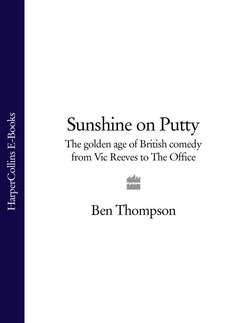Читать книгу Sunshine on Putty: The Golden Age of British Comedy from Vic Reeves to The Office - Ben Thompson, Ben Thompson - Страница 26
On The Hour. because fact into News(s)peak won’t go
ОглавлениеBy the early nineties, however, the time was right for a group of pushy young showbiz up-and-comers to apply Orwell’s critical vision with merciless rigour, albeit with no higher goal than the provision of top-flight radio entertainment. Needless to say, things have changed a great deal since George’s day. The arbitrary50 dystopian rubicon of 1984 has been crossed with no apparent ill-effects, and with the once forbidding edifice of Soviet Communism lying in ruins, the future of parliamentary democracy seems about as secure as it can be.
Yet the shadow of Newspeak – the wilfully obfuscatory language which Orwell imagined in 1984 as the intellectual mechanism of a coercive state – stalks the airwaves of John Major’s Britain as threateningly as ever before. It does so not in the form of governmental decree, but in the crisply presented guise of contemporary current-affairs journalism.
The unseemly combination of euphemism and self-aggrandizement, the ignorance masquerading as knowledge, the inflation of non-stories into headlines, the prurience disguised as moral concern, the wilful compression of human suffering into unrecognizable shapes: it is these all too familiar features of modernday factual programming that the guerilla radio show On The Hour gets to work on. And by the end of the first five-episode series, in the autumn of 1991, the entire amoral apparatus of contemporary news-gathering has been pretty much dismantled.
The glee with which On The Hour sets about doing this is entirely infectious. Listening to the edition in the second series where Chris Morris hawks a faked tape of Neil Kinnock losing his rag at the Labour Party conference around various tabloid newsdesks, there’s a sense of being part of something genuinely outrageous. Not just because there is swearing involved and it’s on Radio 4, but because Morris’s combination of intellectual audacity and technical mastery of his medium seems so much more than equal to the task in hand.
The impact of this sudden rush of surplus capacity is all the more dramatic, emerging as it does from the butt-end of an apparently unbroken tradition of toothless and self-satisfied radio ‘satire’.
‘If you were reasonably intelligent and starting out your career in ‘89 to ‘90,’ On The Hour writer Stewart Lee remembers, ‘it took about two months to crack the formula of topical comedy as it was then.’
What was it about the established formats of Spitting Image and Weekending (within which Lee and his writing partner Richard Herring had cut their comedic teeth) that seemed so tired?
‘It was just so mechanical – if you’d have called it formulaic, they’d have gone “Yeah, so, what’s your problem?”…We did quite a good parody for On The Hour once about a Radio 4 programme called “It’s Satire Day”, where the characters were trying to compress everything that happened in the world into a Robin Hood sketch format.’
Presumably after ten years or so of Conservative government, there was a strong sense for those – like Lee – who also plied their wares out on the stand-up circuit of attacking things that had already been thoroughly savaged?
‘A lot of the people involved in Radio 4 satire probably voted Tory anyway,’ Lee observes sardonically. ‘But beyond that, a lot of the language available to us had just been really debased – to the point where even the word “satire” had started to really annoy me. Satire just seemed like replacing one thing with another, until after a while you start thinking, Why don’t you just say what the thing itself is?’
